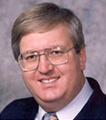From Jan. 24-27, instructors of Drum Corps International member corps and the DCI Board of Directors will meet in Orlando to consider 10 new rule proposals. DCI.org columnist Michael Boo breaks down each of the items that will be considered and gives his insight and opinions on how passage of each rule might affect the direction of the drum corps activity. Part II of this series looks at two different proposals that will attempt to legalize new effects including amplifying brass instruments and allowing for the use of water on the field.
Allowed amplification of brass instruments. Expect drum corps fans to be glued to their monitors awaiting word on the passage or failure of this proposal by the Cadets' director George Hopkins. If passed, brass instruments may be amplified, either by the use of wired or wireless microphones. Like the proposal for electronics also currently on the table, if passed, this would not be implemented until 2009. Amplifying the brass would possibly allow for soloists or smaller ensembles to be heard anywhere on the field and could produce some unique musical scoring techniques to mix the sounds across the field. Brass instruments that don't typically pierce through the louder ensemble could be heard as desired or envisioned by the arranger.
Allowed amplification of brass instruments. Expect drum corps fans to be glued to their monitors awaiting word on the passage or failure of this proposal by the Cadets' director George Hopkins. If passed, brass instruments may be amplified, either by the use of wired or wireless microphones. Like the proposal for electronics also currently on the table, if passed, this would not be implemented until 2009. Amplifying the brass would possibly allow for soloists or smaller ensembles to be heard anywhere on the field and could produce some unique musical scoring techniques to mix the sounds across the field. Brass instruments that don't typically pierce through the louder ensemble could be heard as desired or envisioned by the arranger.

Many corps have utilized amplification percussively to bring new effects to life – like this '05
Phantom Regiment tap dance routine. Next weekend a new proposal to allow amplification for
brass instruments will be weighed.
Phantom Regiment tap dance routine. Next weekend a new proposal to allow amplification for
brass instruments will be weighed.
Use of water in a corps' production. A few years ago, the DCI Board of Directors passed a rule prohibiting the use of water or any other liquid on the field. This was precipitated (pun intended) after several corps used water effects during their show. The liquid ended up on the field and created wet spots that were unanticipated by the following performing corps and also by the turf managers of indoor stadiums that are not built for water drainage.


Water effects like this one seen in the Magic's
2004 production, were banned after a rule prohibiting
the use of liquids on the field was instituted in 2005.
2004 production, were banned after a rule prohibiting
the use of liquids on the field was instituted in 2005.
Coming soon on DCI.org: Parts III & IV look at three proposals that deal with placing restrictions on amplification and soundboard operation. Part V will examine the four remaining proposals that deal with topics including judges, performer age limits and length of performances. Read Part I: electronic instruments.




